Nothing Mickey Mouse about Disney’s impact on Shanghai
New theme park’s target market is 330 million people living in Yangtze River Delta region
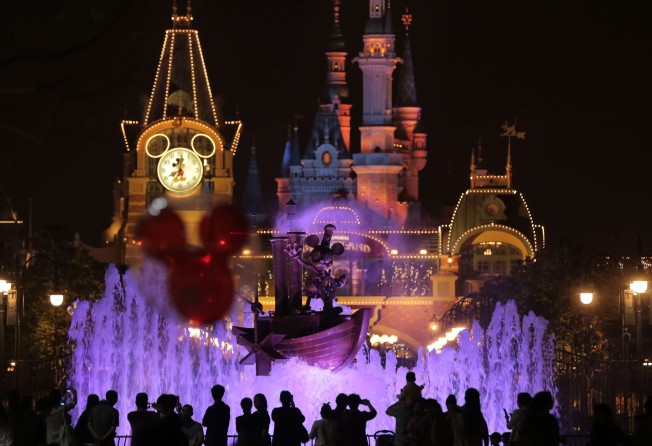
There’s nothing Mickey Mouse about Shanghai Disneyland’s expected impact on the city given the level of enthusiasm ahead of the US$5.5 billion theme park’s official opening on Thursday.
“Shanghai Disneyland is set to have an impact on people’s lifestyles here,” said Professor He Jianmin, director of the tourism management department at Shanghai University of Finance and Economics. “As people enjoy the attractions and performances inside the park, they will eventually be inspired to enjoy their lives.”
The theme park, the latest world-class mega project in the mainland’s most developed city, is part of Shanghai’s quest to be counted among the world’s great metropolises.
It’s expected to boost the city’s gross domestic product by 0.8 per cent directly and by double that amount once visitors’ ancillary spending is factored in. But He said the gargantuan entertainment project could also sate mainlanders’ appetite for cultural products.
That’s prompted other experts to sound alarms about the park’s cultural impact.
Shanghai’s chauvinism and grand ambition to transform itself into a global financial centre have made it an easy target for criticism in the past decade.
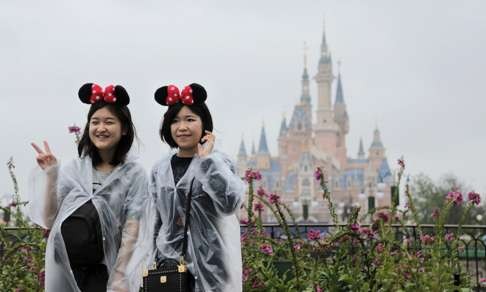
The city has made only slow progress in implementing financial liberalisations, while its much-hyped free-trade zone, touted as a Hong Kong-style free marketplace, has disappointed foreign businesses due to a lack of substantive policies.
But for Shanghai’s 25 million residents, Disneyland is more than a grand plan to make the city an international centre of everything. Full-throated praise of Mickey Mouse’s move into Shanghai can often be heard on the city’s streets, with residents avidly looking forward to a taste of the top-quality entertainment attractions offered by the world’s most successful theme park operator.
“Forget about the financial centre and free-trade zone. People, after getting rich, hope to have some enjoyable experience at fun-filled venues,” said Chen Lanying, a retired worker who visited the theme park in early June during its trial operations, which began on May 7. “It was a wonderful experience and I’ll spend money and time in future to visit it again.”
And the target market for Shanghai Disneyland, Walt Disney’s sixth such project worldwide, is even bigger: the 330 million people living in the Yangtze River Delta, within a three-hour drive of the park.
They have become more affluent in recent years and are used to splashing out thousands of yuan on entertainment activities such as movies, musicals and pop music concerts.
“Every year, we earmark a budget of at least 10,000 yuan (HK$11,800) for leisure activities, but we aim only those high-quality shows and services,” said Shen Ying, a middle school teacher who also visited Shanghai Disneyland during its trial operations. “I would give it a big thumbs-up because the attractions and performances provided a unique experience.”
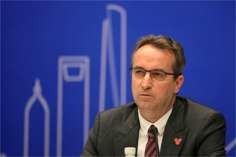
Murray King, Shanghai Disney Resort’s vice-president of public affairs, said in late May that tickets for the first two weeks following the park’s official opening had been sold out and it would take measures to control crowds.
It has been estimated that Shanghai Disneyland, covering an area of about 4 sq km, will receive 15 million visitors a year.
A daily ticket to the theme park will cost 499 yuan during peak times such as holidays and weekends and 370 yuan on other days, and analysts predict visitors’ per capita spending, including souvenir purchases and hotel stays, will top 1,300 yuan.
That projected spending would translate into annual sales of 19.5 billion yuan of annual sales, 0.8 per cent of Shanghai’s GDP, while bullish analysts forecast the park could generate total economic output of more than 40 billion yuan including non-local tourists’ spending on other products and services in Shanghai.
Liu Zhengyi, deputy director of the 24.7 sq km Shanghai International Tourism and Resorts Zone’s administration commission, said Disneyland was just one of the projects planned for the zone, part of the city government’s plan to develop a world-class tourist destination and create a new growth engine for the local economy.
However, the Shanghai Disneyland project, approved by the city government in 2009, has also attracted doubts about its profitability and criticism for being a Western cultural implant.
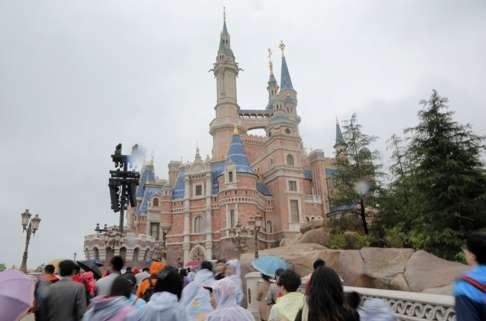
Wang Jianlin, one of China’s richest men and the chairman of Dalian Wanda Group, a Chinese property-to-entertainment conglomerate planning a string of rival Wanda City theme parks, told state broadcaster China Central Television in late May that he thought Shanghai Disneyland would struggle due to hight prices and bad weather.
“With the existence of Wanda, Shanghai Disney won’t be able to post profits in 20 years,” Wang said, adding that Shanghai’s summers were too sultry and its winters too chilly for outdoor entertainment activities.
However Professor He disagreed, predicting Shanghai Disneyland park would recoup its investment in about 12 years based on projected visitor numbers and estimates of their spending.
The Disney resort, including the theme park and other commercial complexes, is 57 per cent owned by the city government, with Walt Disney holding the rest, while the US media and entertainment giant has a 70 per cent stake in its management company, with the city government owning 30 per cent.
Professor Zhou Lingqiang, a tourism management specialist at Zhejiang University, said Shanghai Disneyland also carried enormous cultural implications.
“With the opening of the park, the Disney culture will reach a new high on the mainland as by-products such as films and animation will soon follow,” Zhou said.
Disney has been accused of force-feeding homogenised culture to international markets, with Disneyland Paris, created in the early 1990s, widely regarded as it biggest failure, partly due to cultural differences.
But there has been little opposition to Shanghai Disneyland from the Chinese public, and the few who have spoken out against it have been widely criticised.
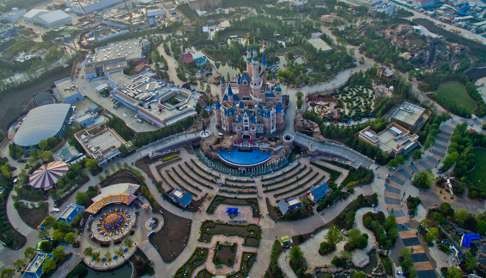
Mainland actor Sun Haiying used the weibo microblogging platform last year to urge internet users not to visit the park as it represented “sheer American values”. He also asked the Ministry of Education to tell students not to go to Disneyland, only to reap mocking comments that he should never leave his own country.
His weibo account was among a number of high-profile accounts shut down by the authorities earlier this year for “misleading” remarks that had “very bad impacts”.
Professor Yang Yang, from East China Normal University, warned the younger generation would grow up lacking memories of Chinese cultural symbols if Mickey Mouse and Donald Duck were all they were exposed to.
“It would be impossible for Shanghai Disneyland to exist without local authorities’ support and protection,” he wrote in a recent article published in the Exploration and Free Views monthly. “Will the authorities have the same determination to support innovation and creation in local culture as they do for Disneyland?”
But Professor He said Disney would help officials and people understand what culture was.
“To put it in a simple way, culture is the products and services that can make people happy,” he said.
Whether Shanghai’s drivers will be happier after the park opens has been called into question, with the influx of visitors likely to make the roads in and near the city even more congested.
A report by Shenwan Hongyuan Securities Strategy said a “conservative estimate” of 10 million visitors to Disneyland a year would increase the number of passengers being transported in the city by 3 per cent to 5 per cent. And with growing demand for inter-city services such as buses and high-speed trains, Disneyland tourists would spend roughly 4 billion yuan a year on transportation in the Yangtze River Delta region, it said.
Metro line 11 has been extended to the theme park and Shanghai has also built eight roads leading to the resort and a public transport junction designed to tackle the heavy traffic.
But the authorities are still bracing themselves for serious congestion, especially on weekends and public holidays, and have advised visitors to use public transport to avoid traffic jams.
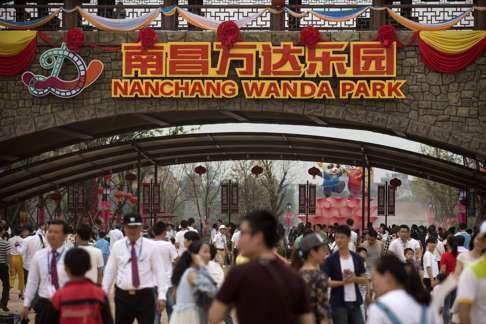
Yang Xiaoxi, deputy director of the municipal transportation committee, told a press conference last month that the authorities would release information about congestion across the city regularly to guide traffic flows and would also coordinate with the highway management departments in neighbouring Zhejiang and Jiangsu provinces.
The metro station would limit the number of people boarding trains by setting up waiting areas and putting on more buses when needed, Yang said. Ten new bus lines, including ones connecting the resort with two railway stations and two airports, will go into operation this month.
The resort would bring Shanghai hotels more customers during traditionally slack seasons for expositions and trade shows, said Ma Jing, senior director of revenue management at Shanghai-based yield management consulting firm Hong Que.
Such commercial events usually took place on weekdays in spring and autumn, while the peak visiting periods for Disney were expected to be the summer and winter vacations, and weekends in spring and autumn. Hong said that could see occupancy rates at Shanghai hotels rise by five percentage points in the second half of the year.
The room occupancy rate last year at Shanghai hotels covered by the government’s star rating system was 65.6 per cent.
The benefits could spread wider still, with the Shenwan Hongyuan Securities Strategy report saying the “Disney frenzy” would focus more attention on theme parks in general, with domestic parks set to benefit.
China has been on a theme-park-building spree in recent years, with a recent report by the Qianzhan Industry Research Institute saying every province or directly controlled municipality is now home to at least 20 theme parks.
Wanda opened the first of 15 to 20 planned Wanda City theme parks around China in Nanchang, Jiangxi province, late last month, only to be accused by Disney of infringing upon its intellectual property by featuring some its cartoon characters. Wanda replied that the characters had been used in promotions by stores in a shopping mall attached the theme park and their use had been officially licensed by Disney.
Shenwan Hongyuan Securities Strategy said in its report that the sale of souvenirs based on its cartoon characters was a major advantage for Disney, estimating total sales on the mainland at more than US$13 billion.
That would only increase with the opening of Shanghai Disneyland, it said.